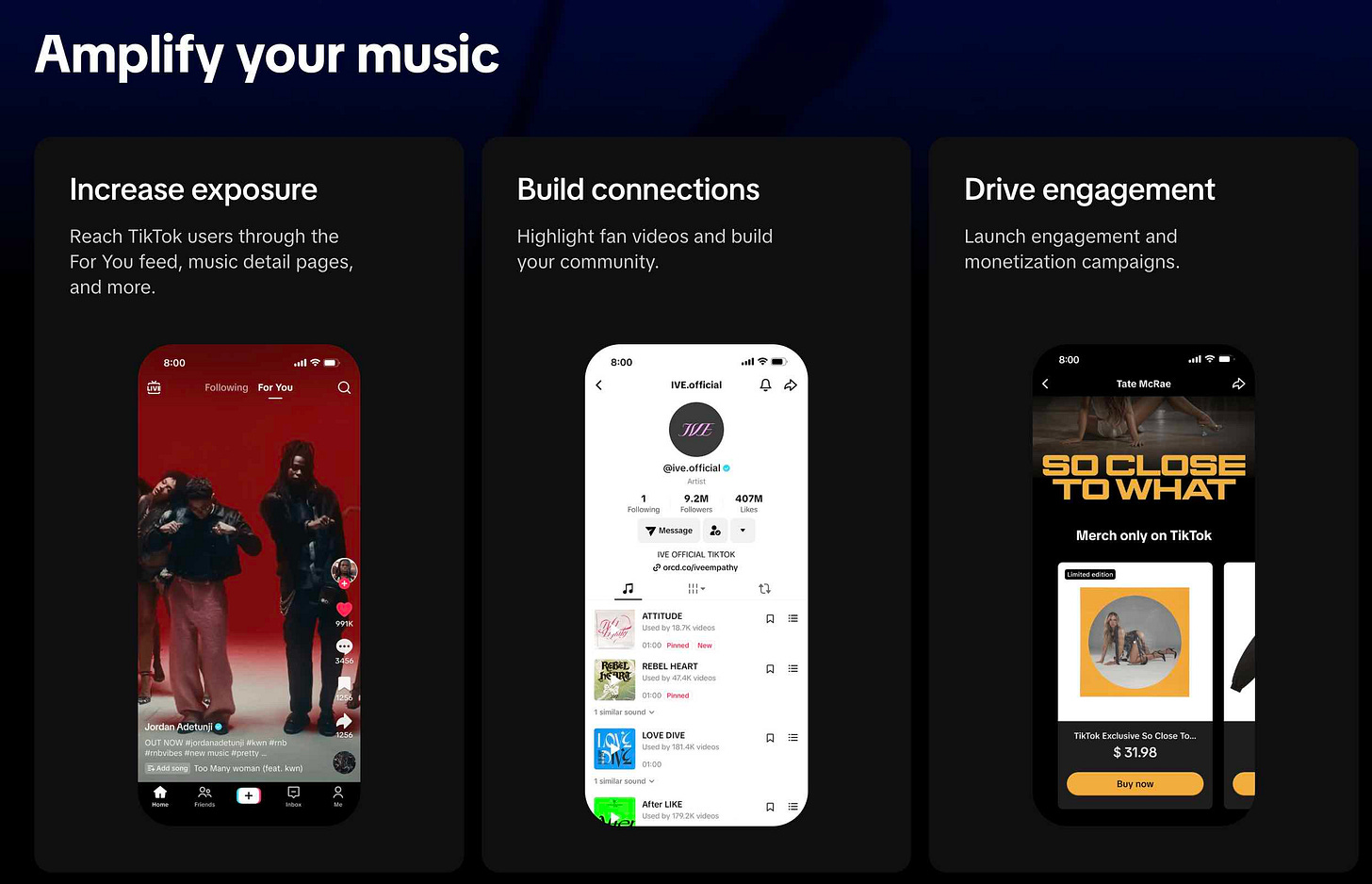Data Without Dollars: TikTok for Artists Lands in Nigeria, But Monetization Remains Missing
Earlier this year, the stark inequality facing African creators on TikTok was visible. Despite being among the platform’s most innovative and culturally influential users, African creators remain locked out of its Creator Fund and other revenue-sharing programs. TikTok has thrived on African creativity—fueling global dance crazes, music trends, and viral aesthetics—but has failed to extend financial reciprocity.
This week’s announcement that TikTok is launching TikTok for Artists in Nigeria adds a new wrinkle to that story. On the surface, the move looks like progress: a comprehensive insights platform that promises artists and their teams daily analytics, performance dashboards, and campaign tools to help them better manage fan engagement and pre-release strategies.
But beneath the press release gloss lies a deeper, more uncomfortable question: is TikTok really empowering African artists, or is it perfecting its ability to extract value without compensation?
TikTok for Artists: What’s on Offer
TikTok’s Nigerian rollout mirrors its global strategy. The new platform includes:
Song Performance Data: Tracking views, posts, and creator engagements per track.
Post-Level Analytics: Metrics like completion rates, comments, and shares.
Audience Demographics: Gender, age, and language breakdowns.
Pre-Release Campaign Tools: Letting artists drive pre-saves to Spotify, Apple Music, and other DSPs.
Educational Resources: Step-by-step guides, best practices, and career sustainability content.
For Nigerian musicians—already among the most globally successful artists in the streaming era—this toolkit could be invaluable. It provides transparency, data, and a bridge between virality and revenue streams outside TikTok.
But note the fine print: TikTok for Artists does not introduce direct monetization. It equips artists with knowledge, but stops short of paying them for the cultural gold they mint on the app.
The Data Dilemma: Transparency or Surveillance?
At first glance, TikTok for Artists is about transparency. Yet, if we widen the lens, it looks more like surveillance economics.
By offering Nigerian creators granular data on engagement, TikTok simultaneously collects an even deeper layer of insights for itself. Every dashboard artists access represents an even more detailed backend dataset TikTok monetizes via advertising, trend prediction, and global content strategy.
In other words: artists see their reflection; TikTok sees the whole mirror factory.
This imbalance mirrors the broader inequity in the global creative economy: African creators supply the culture, platforms capture the value.
The Monetization Gap: Africa Still Left Behind
Let’s revisit the numbers. TikTok’s Creator Fund, launched in 2020, pays creators in select regions based on video performance. But as of mid-2025, African creators remain excluded.
Nigeria is TikTok’s second-largest market in Africa after South Africa, with an estimated 34 million monthly active users.
TikTok is the second most-used social platform on the continent, behind WhatsApp.
African creators like Khaby Lame (Senegalese-Italian) have proven global appeal—but those based within Africa itself remain structurally excluded from TikTok’s payout mechanisms.
The contradiction is glaring: TikTok recognizes Africa as a cultural engine, but refuses to extend financial equity. Instead, it offers analytics without income.
Music as the Trojan Horse
Why launch TikTok for Artists in Nigeria, specifically? The answer lies in Africa’s booming music economy.
Afrobeats has become a $200 million+ global export, with Nigerian stars like Burna Boy, Wizkid, Tems, and Tyla topping charts worldwide.
According to IFPI’s Global Music Report 2024, Sub-Saharan Africa was the fastest-growing region for recorded music revenues (up 18.6% YoY).
TikTok has been directly credited with the rise of hits like CKay’s Love Nwantiti and Rema’s Calm Down, which both achieved viral liftoff via user-generated content on the platform.
In short: Nigerian music is already doing the work of global cultural dominance. TikTok’s move ensures it stays the gateway platform for African music discovery, while exporting the revenue flows elsewhere (Spotify, Apple Music, Western record labels).
The danger is that TikTok cements itself as an intermediary gatekeeper, controlling audience discovery without sharing in the financial uplift.
Lessons from YouTube and Spotify
This is not unprecedented. YouTube, for years, positioned itself as the place where African artists could “find global audiences.” But monetization lagged due to low Cost per Mille (CPM) rates in African markets. African creators were generating billions of views—yet earning a fraction of their Western counterparts.
Spotify has been similarly uneven. Despite its recent African expansion, artist payouts remain paltry, tied to streams that undervalue African audiences compared to high-spending Western markets.
TikTok seems poised to repeat this cycle: build influence through culture, defer economic equity through policy.
The Illusion of Empowerment
By giving artists dashboards, TikTok offers the illusion of empowerment without redistribution.
Artists gain visibility of their influence, but not financial stake in it.
Managers gain campaign tools, but still rely on brand deals and streaming platforms for revenue.
TikTok gains deeper data, which fuels its ad business and algorithmic dominance.
The power asymmetry remains untouched.
Nigeria as Test Market or Token Market?
Launching in Nigeria makes strategic sense: the country is Africa’s cultural epicenter, a hub for music, fashion, comedy, and digital innovation. But it also risks becoming a token launchpad—a way for TikTok to claim African presence without structurally addressing African exclusion.
We’ve seen this pattern before:
Meta opened an African office in Lagos in 2020, but its monetization pathways for creators remain limited.
Netflix invested in Nollywood productions but struggled with sustained pipeline funding.
Twitter (now X) became a tool for Nigerian activism (#EndSARS) but offered little revenue infrastructure for the very creators driving engagement.
The recurring theme is surface-level engagement without deep systemic change. TikTok’s Nigeria move could follow the same playbook.
Toward Real Equity: What TikTok Must Do
If TikTok is serious about Africa, TikTok for Artists must be the beginning—not the end—of reform. Here’s what real commitment would look like:
Expand Monetization Programs
Extend the Creator Fund, TikTok Pulse, and ad-revenue sharing to African creators. Recognition without remuneration is exploitation.Integrate Local Payment Systems
Partner with Flutterwave, M-Pesa, Paystack to overcome payout barriers. Stripe dependency is not an excuse.Level Global Exposure Algorithms
Adjust discoverability so African creators don’t remain trapped in regional silos. Culture is global; the algorithm must reflect that.Invest in Local Infrastructure
Build creator hubs, studios, and educational pipelines—not just dashboards. Support the ecosystem, not just data extraction.Develop African-Focused Ad Markets
Equip African brands to reach African audiences through creators, instead of prioritizing Western ad dollars.
The Broader Stakes: Africa’s Digital Economy
This debate is bigger than TikTok. It cuts to the heart of Africa’s role in the global digital economy.
Right now, Africa provides cultural raw materials—music, dance, comedy, storytelling—while platforms headquartered in the U.S. and China capture the economic value. The cycle mirrors old extractive economies: Africa supplies, others profit.
If TikTok for Artists is to be more than window dressing, it must confront this legacy. Otherwise, we risk building a future where African creators drive global trends but remain second-class citizens in the digital economy.
Conclusion: Tools Without Power
TikTok for Artists in Nigeria is a milestone. But milestones can be deceptive. This platform gives artists visibility into their impact, but not a fair share of the value it generates. It empowers creators with tools, but not with power.
Earlier this year, I argued that African creators are locked out of TikTok’s monetization schemes. Today, with TikTok for Artists, the lock remains—only the window is clearer.
The real test will be whether TikTok evolves from a platform that extracts culture to one that invests in culture. Until then, Nigerian artists and African creators will continue to light up global screens—while the wealth of their influence flows elsewhere.
A guest post by
A curious mind exploring the crossroads of creativity and insight.0




